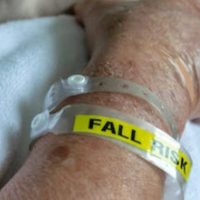Falls In Hospitals: Dangerous And More Common Than You May Think

If you worry about being injured in the hospital, your thoughts probably go to things like falls, or infections, or just being neglected by hospital staff. You probably wouldn’t think of falling as a risk in a hospital—but more and more, falls in hospitals are becoming more common.
How Common Are They?
It is estimated that about a million people fall every year in hospitals. One in four victims of falls that happen in hospitals are in the elderly population, but despite that number, they actually are not the demographic that falls the most in hospitals. That distinction belongs to people in their 50s.
Why Younger Victims?
There are many theories on why the younger demographic is more likely to fall.
Falls in hospitals don’t just include patients, they include visitors, and visitors in their 40s or 50s, visiting older relatives, may be more likely to be walking about and thus, more likely to be the victim of falls.
Patients in their 40s or 50s who are patients, may be more mobile than their older counterparts, and more likely to have a false sense of confidence, causing them to walk before they are able to or before doctors clear them to do so, and they also may be more likely to wander in areas that patients should not be walking in.
Patients also are simply not familiar with their surroundings; just like when driving, they may be distracted navigating hallways and corridors.
Why More Dangerous?
Hospital falls are dangerous. Patients who fall are already suffering from an injury, illness or disability, and may be ill equipped to cushion a fall, or even see something on the ground that could cause a fall. A patient’s illnesses or ailments may make them less able to take evasive maneuvers, to brace their bodies for the fall, or to fall in a way that minimizes damage to their bodies.
Hospital floors are generally not meant for living, walking or falling; they are often hard tile or similar material, more likely to lead to a bone break or other serious injury than a carpeted surface would be.
What Can be Done?
Hospitals are now working to lower the amount of falls that are happening. There are a number of strategies they are currently using, which include:
- Putting armbands on patients who are fall risks, so staff knows if they see one of these patients walking about, to get them back to their rooms
- Providing more stimulation for patients, so boredom doesn’t cause wandering
- Increasing nursing staff, as many patients start to wander when calls for attention from staff are ignored for too long
- Bed alarms, that alert staff when a patient has gotten out of bed
If you were a victim of a fall-in a hospital or anywhere else–we can help. Contact our Rhode Island personal injury lawyers at Robert E. Craven & Associates at 401-453-2700 today.
Sources:
ncbi.nlm.nih.gov/pmc/articles/PMC6446937/
bmchealthservres.biomedcentral.com/articles/10.1186/s12913-022-07638-7
